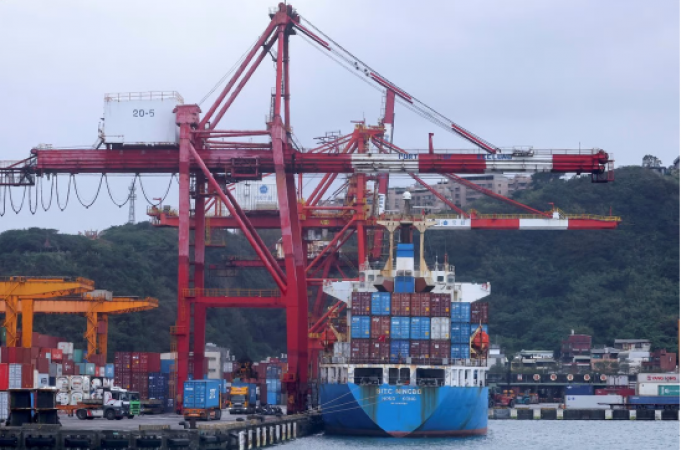
Taipei: The island's economy has entered "a softer phase" after several trade indicators declined for the 12th consecutive month and after signs that disruptions to mainland China, Taiwan's main trading partner, may soon end.
The National Development Commission reported that the combined score of the seven key indicators was 95.63 in October, down about 1% from September.
The index, which also includes data on net hiring, export orders, the stock market, the issuance of building permits, the availability of money and the health of the manufacturing sector, aims to assess the economy's prospects over the coming six years.
Also Read: India's growth is linked to its technological advancements: Jaishankar
"It probably means that Taiwan's economy is in a slowdown," according to Tony Fu, an economist at Standard Chartered Bank in Taipei.
The global economy appears to be slowing down, and demand for the technology is further declining.
The island's roughly US$850 billion economy, which is home to 4,200 Taiwanese businesses, is under particular pressure, according to economists in mainland China, which also ranks as Taiwan's top investment destination.
In the first ten months of 2022, Taiwan's exports to mainland China totaled US$103 billion, a slight decline from the same period in 2021.
Chinese direct investment from Taiwan Between January and October, China's revenue declined 3.2% year-on-year to US$4.16 billion.
Taiwan's Ministry of Economic Affairs reported last week that Taiwan export orders to mainland China and Hong Kong totaled US$10.5 billion last month, a decrease of 26.7% from the previous year.
As mainland China struggles to manage its manufacturing sectors due to uncertainty around the zero-Covid policy, this is expected to continue through the first half of 2023, according to Moody's Analytics economists Steven Cochrane and Katrina L.
In China this month, rising coronavirus infections have sparked new lockdowns and demonstrations that could further hurt consumer spending and destabilize international supply chains.
While some Taiwanese businesses sell finished goods to the mainland's larger market, others rely on Chinese supply chains to assemble PCs and smartphones for export to other countries.
Also Read: Despite a weaker dollar, the equity bear market rally will last until 2023
Moody's Analytics economists continued, "Taiwan's economic outlook is heavily influenced by its relationship with China."
"Taiwan's economic prospects will suffer if trade relations deteriorate over a long period of time."
About 60% of the world's semiconductors are produced in Taiwan, and the only major indicator that grew in October was imports of semiconductor equipment, according to the commission.
According to Rajiv Biswas, chief economist for Asia-Pacific with S&P Global Market Intelligence, semiconductor exports remained strong after surging 19% year over year in October due to a "persistent backlog" of global orders, the lowest since June last year. had accumulated till ,
However, according to Moody's Analytics economists, Taiwanese companies are already planning to set up factories in the US and Japan to "take better advantage" of offshore technologies.
Mainland Chinese authorities banned several imports in August when US House Speaker Nancy Pelosi visited Taipei. China views self-ruled Taiwan as a separate province and has vowed to eventually unite the two sides, by force if necessary.
A local election victory for the Kuomintang, a party friendly to the mainland, could prompt Chinese authorities to extend special economic favors to party-controlled cities, according to Huang Qi-bo, associate professor of diplomacy at National Chengchi University in Taipei. Is. counties.
Moody's Analytics economists continued, "China is an important source of final demand, so there is significant untapped potential for Taiwan if economic ties are to strengthen, including tourism and service exports including merchandise trade."
Also Read: Gartner predicts a 3.6% decline in worldwide semiconductor sales growth in 2023
Based on leading indicators from the first quarter of 2019, Taiwan's central government will probably try to boost the economy, Fu said.
They anticipate that the authorities will stop raising interest rates, provide financial support to the economy, and prevent any increases in electricity and nationalized healthcare prices.